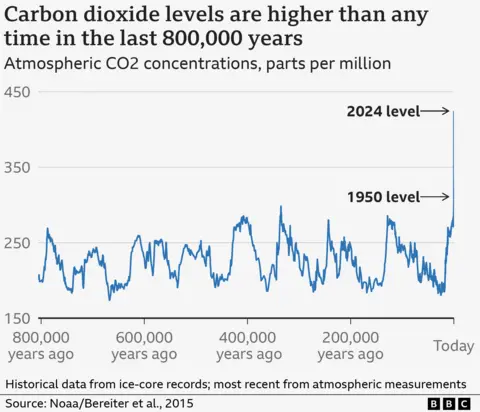President Donald Trump has once again vowed to withdraw the United States from the Paris climate accord, the world's most important effort to combat rising temperatures.
The first Trump administration made a similar move in 2017, but the move was quickly reversed on President Joe Biden's first day in office in 2021.
The United States must now wait a year before formally withdrawing from the agreement. The White House has declared a "national energy emergency," outlining a series of changes that would reverse U.S. climate regulations and boost oil and gas production.
Previously, global temperatures in 2024 were expected to rise by more than 1.5 degrees Celsius above pre-industrial levels for the first time in history.
While the Paris Agreement is not a legally binding treaty, it is a document that promotes global cooperation to limit the causes of global warming.
President Trump also expressed distaste for this collaborative approach in a 2017 statement in which he said he was elected “to represent the people of Pittsburgh, not the people of Paris.”
The Paris Agreement sets out this temperature threshold above which the world faces extremely dangerous impacts.
The United States will now join Iran, Yemen and Libya as the only countries not currently involved in the deal, which was signed in the French capital 10 years ago.
Trump signed an order to withdraw from the Paris climate agreement at the White House on Monday night, including a letter to the United Nations explaining the decision.
He also declared a "national energy emergency" to roll back many Biden-era environmental regulations.
Trump called the Paris Agreement a "rip-off" during a speech at Capital One Arena in Washington, D.C., after being sworn in.
"We're going to drill, baby, drill," he said earlier in his inaugural address.
The new president also vowed to usher in a new era of oil and gas exploration in the United States.
"We will lower prices, replenish our strategic reserves to the top, and export American energy around the world," he told the audience.
"We will become a wealthy nation again, and the liquid gold at our feet will help make that happen."

Yet America's fossil fuels are already flowing like never before.
U.S. oil production has increased by 70% since 2016, and the United States is now the world's leading producer and exporter.
Likewise, U.S. liquefied natural gas (LNG) exports went from almost zero in 2016 to becoming the global leader.
The new administration said the president would also end the Green New Deal, or Inflation Reduction Act, Biden's signature climate policy that funneled billions of dollars into clean energy.
The president said he would also roll back efforts to boost electric vehicle ownership, which he calls Biden's "EV mandate," and step up efforts to save the U.S. auto industry.

He would also end leasing federal lands and waters to “large wind farms that are destroying our nation’s landscape.”
United Nations climate change chief Simon Steele said the United States risks missing out on last year's $2 trillion global clean energy boom.
"Embracing it will mean huge profits, millions of manufacturing jobs and clean air," he said in a statement.
“Ignoring this will only funnel vast wealth to rival economies, while climate disasters like droughts, wildfires and superstorms worsen, destroying property and businesses, hitting food production across the country, and driving price inflation across the economy. "
President Trump’s previous efforts to withdraw the United States from the Paris Agreement provided a rallying cry for many Americans frustrated by the withdrawal.
Internationally, the withdrawal of U.S. troops is also a unifying force for various countries.
This time around, though, a withdrawal could do more damage to global efforts to limit emissions, as climate change is no longer a priority for governments.
Other countries, such as Argentina, may follow the United States' lead.
Developing countries are also angry after COP 29 in Azerbaijan, as rich countries struggle to improve financial support.
But after experiencing previous Trump attacks, people also feel that this may not be the United States’ last word on the Paris Agreement.
"The door to the Paris Agreement remains open and we welcome the constructive engagement of all countries," UN Secretary-General Simon Steel said.

